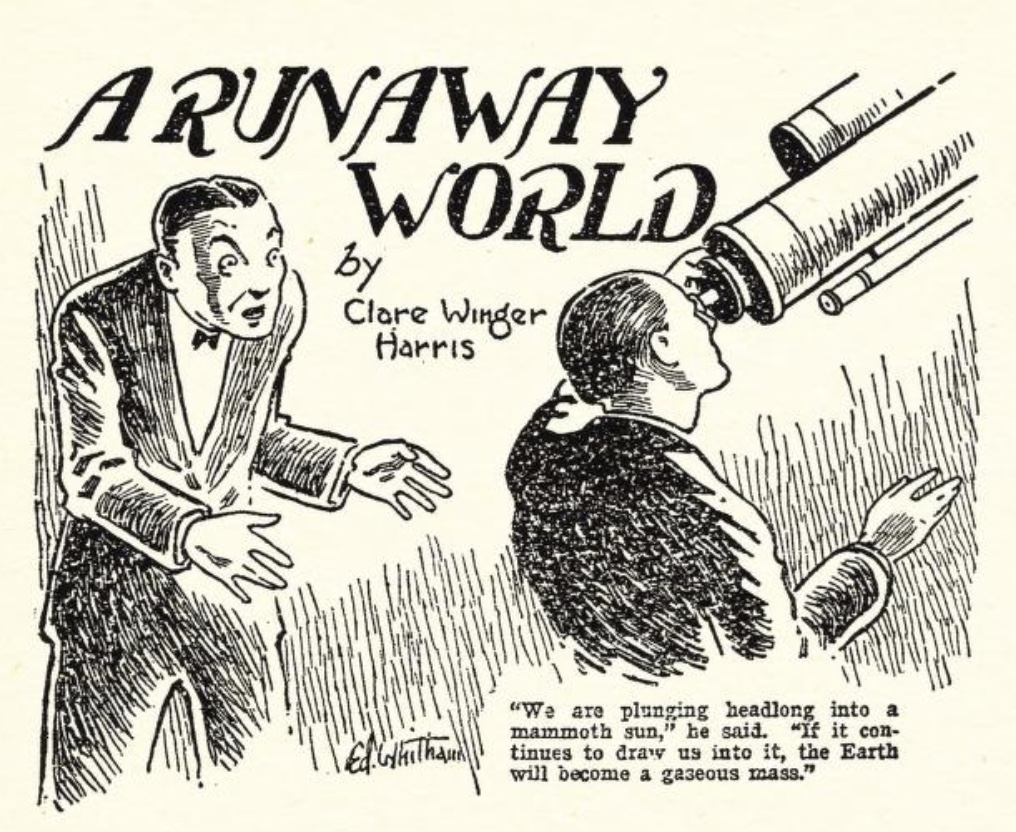A RUNAWAY WORLD (8)
By:
December 19, 2022

HiLoBooks is pleased to serialize “A Runaway World,” by Clare Winger Harris. This story, her first, appeared in the July 1926 issue of Weird Tales; it entered the public domain in 2022.
ALL INSTALLMENTS: 1 | 2 | 3 | 4 | 5 | 6 | 7 | 8.
That evening the townspeople who had not already migrated to cooler regions, held a jubilee in Central Park Square. The principal speaker of the evening was Oscar
Marden, who explained to the people what capers our planet had been cutting during the past three years. After his address I noticed that he kept gazing skyward as if unable to bring his attention to Earth.
“Say, will you come to the observatory with me now?” he asked as I was talking to a group of friends shortly afterward.
“I’ll be right along,” I replied.
Scarcely half a block away we saw Ed Zutell going in the general direction of home.
“Do we want him?” I asked, not a little annoyed. “Can’t we beat it up an alley? I’d like this conference alone, for I know by your manner you have something important to tell me.”
“In the last part of what you say you are right,” responded Marden, “but in the first part, wrong. I do want Ed, for I have something to show him, too.”
When the three of us were again in the familiar setting of the past three years, Marden gazed for quite some time at the heavens through the great instrument. Finally he turned to us with a wry smile on his lips and a twinkle in his eyes.
“Just take a peep, boys, and tell me what you see.” He strove in vain to conceal his amusement.
We both agreed that we saw a rather reddish star.
“That ‘reddish star’,” said Oscar, impressively, “is our old friend Mars, and he is revolving in an orbit between us and the sun!”
Ed and I looked at each other speechlessly for some seconds; then without a word Ed dropped on his knees before me in something of the fashion of an Arab bowing toward Mecca.
“What’s the big idea?” I asked, not a little frightened, for I wondered if the confinement of the years had crazed him.
Oscar was laughing so that he had to hold on to the telescope for support, so I concluded there was nothing very radically amiss in the situation.
“I am worshiping a god,” said Ed, “for so I would call anyone who can move the planets about so that they line up in accordance with his conceptions of the way they ought to do.”
“I’d like to take the credit,: I laughed, then more seriously, “but a higher authority than mine has charge of the movements of the planets.”
“Well, it certainly is uncanny how you have your way in everything,” grumbled Ed.
There is little more to tell. The world soon adjusted itself to its new environment. People became accustomed to seeing the sun rise in the West and set in the East.
Vera was ineffably delighted with the new system of time which was necessitated by the increased orbit of the Earth. Inasmuch as it now required a trifle over two years for our planet to make a journey once around the new sun, Vera figured that she was less than half her former age, and this new method of figuring, I may add, others of her sex were not slow to adopt.
The huge sun rendered the Earth habitable clear to the poles, and strange to say, it caused very little increase of heat in the tropics. Astronomers proved that, though a big sun, it was not as hot a one, for it was in the later stages of the cooling-off process to which all suns eventually come. Two planets had already been journeying around the giant sun before the advent of Mars and Earth, and what they thought of the intrusion of the two strange worlds was before long made evident through radio communication.
To the astronomers of this new era the welkin presented a fascinating opportunity for studying new neighbors in space.
And thus the chemical experiment of the superpeople of that vaster cosmos was finished.
RADIUM AGE PROTO-SF: “Radium Age” is Josh Glenn’s name for the nascent sf genre’s c. 1900–1935 era, a period which saw the discovery of radioactivity, i.e., the revelation that matter itself is constantly in movement — a fitting metaphor for the first decades of the 20th century, during which old scientific, religious, political, and social certainties were shattered. More info here.
SERIALIZED BY HILOBOOKS: James Parker’s Cocky the Fox | Annalee Newitz’s “The Great Oxygen Race” | Matthew Battles’s “Imago” | & many more original and reissued novels and stories.
